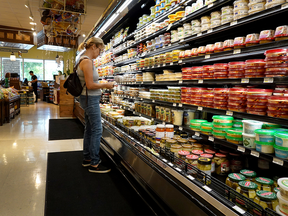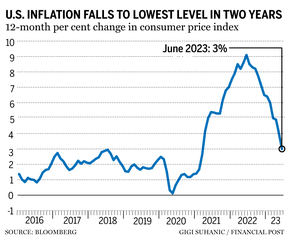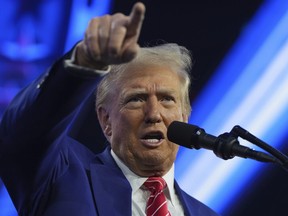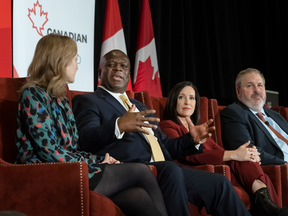GDP estimates revised higher in survey

Article content
Some of the forecasters who were first out of the box to predict a U.S. recession are starting to hedge their bets as inflation ebbs and the economy remains resilient.
Advertisement 2
Article content
Deutsche Bank vice-chair of Research Peter Hooper and Fannie Mae chief economist Doug Duncan now say it’s essentially a toss-up whether the economy suffers a recession or enjoys a soft landing and keeps growing, though both still believe a downturn is more likely than not.
Article content
Nomura Securities International senior economist Aichi Amemiya is also sticking by his firm’s recession forecast, though he added, “it’s getting to be a close call.”
The sentiment was echoed in Bloomberg’s July survey of economists, in which estimates for gross domestic product were revised higher for the second and third quarter. However, forecasters still say there’s a 60 per cent chance the U.S. will fall into recession in the next 12 months.
Article content
Advertisement 3
Article content
Duncan said housing starts and home prices have been stronger than expected, providing the economy with support. Amemiya also referenced the strength of new automobile sales.
Paradoxically, Hooper credits the Federal Reserve’s steep rate hiking campaign for the reduced risk of a recession. That’s helped re-anchor inflation expectations, increasing the chances price pressures can ease without a meaningful decline in the economy.

Economists surveyed by Bloomberg are growing more optimistic as inflation cools. The personal consumption expenditures price index — the Fed’s preferred inflation metric — is seen rising 2.2 per cent in the final quarter of 2024, according to the July survey. Last month, economists expected 2.3 per cent.
Advertisement 4
Article content
Excluding food and energy, the so-called core PCE price index will likely moderate through the first half of next year by more than predicted last month. Economists also see the consumer price index (CPI) cooling faster through the end of next year.
The survey of 73 economists, conducted from July 14-19, was taken just after the latest CPI report showed the U.S. inflation rate slid in June to a more than a two-year low. That prompted many traders to bet that next week’s expected interest-rate hike by the Fed will be the last of this cycle.
“The Fed is likely to skip September after a July hike. The next opportunity in November will likely take place against the background of a recession, as real rates become more restrictive,” Philip Marey, senior U.S. strategist at Rabobank, said in a survey response. “Therefore, we do not expect the second hike in the dot plot to materialize.”
-

Traders fully convinced of another Fed rate hike next week
-

China slowdown could spill over, but Yellen doesn’t expect recession
Economists in the survey also now expect fewer rate cuts from the Fed next year.
Bloomberg.com
Article content
U.S. recession less likley say some economists
2023-07-21 13:00:59






Comments
Postmedia is committed to maintaining a lively but civil forum for discussion and encourage all readers to share their views on our articles. Comments may take up to an hour for moderation before appearing on the site. We ask you to keep your comments relevant and respectful. We have enabled email notifications—you will now receive an email if you receive a reply to your comment, there is an update to a comment thread you follow or if a user you follow comments. Visit our Community Guidelines for more information and details on how to adjust your email settings.
Join the Conversation